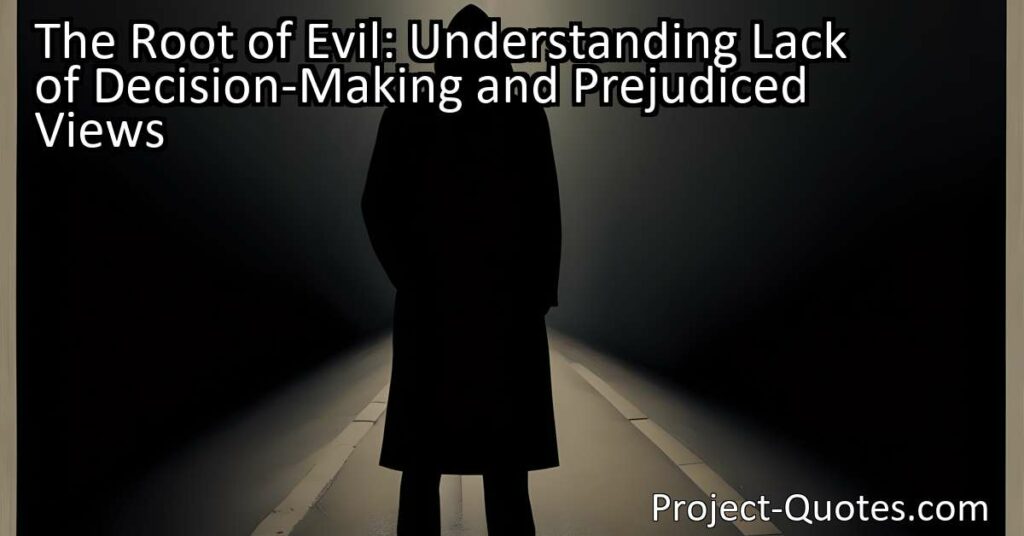The sad truth is that most evil is done by people who never make up their minds to be good or evil.
Hannah Arendt
In the title “The Root of Evil: Understanding Lack of Decision-Making and Prejudiced Views,” the content explores why people do bad things and why some individuals hold prejudiced views. It emphasizes that most evil is done by individuals who never truly make up their minds to be good or evil. By understanding the factors influencing this lack of decision-making and working towards fostering moral responsibility, education, and inclusive communities, we can strive for a world where prejudice and evil are diminished.
Table of Contents
Meaning of Quote – The sad truth is that most evil is done by people who never make up their minds to be good or evil.
Have you ever stopped to wonder why people do bad things? Why some individuals seem to embrace evil actions while others strive to do good? The famous philosopher and political theorist Hannah Arendt once explained that the sad truth is that most evil is done by people who never truly make up their minds to be good or evil.
At first glance, this quote might seem puzzling. How can someone not decide to be good or evil? Aren’t we all responsible for our own actions? Well, Hannah Arendt suggests that the roots of evil lie in the absence of conscious decision-making. It’s not that individuals actively choose to be evil, but rather, they lack the moral conviction and clarity to choose the path of goodness.
When we dig deeper into Arendt’s insight, we realize that the world is not divided into purely good and purely evil individuals. Instead, many people fall into a gray area where their actions are shaped by a mix of circumstances, societal influences, and personal biases. In this complex web of factors, it becomes easier for individuals to overlook their moral responsibilities and give in to the temptations of evil.
One of the main reasons behind this lack of decision-making is a phenomenon known as moral disengagement. Moral disengagement refers to the psychological process through which individuals disconnect their actions from their moral values, enabling them to engage in harmful actions without feeling guilt or remorse. This detachment can occur through various mechanisms, such as dehumanizing others, minimizing the consequences of one’s actions, or shifting responsibility onto external forces.
For example, a person who witnesses bullying but fails to intervene may disengage morally by dehumanizing the victim, convincing themselves that they deserve the mistreatment or that it’s not their responsibility to intervene. By doing so, they effectively distance themselves from the moral implications of their inaction. This disengagement allows individuals to act against their natural inclination for good and become passive enablers of evil.
Moreover, societal factors also play a significant role in shaping people’s moral decision-making. As social creatures, humans are deeply influenced by the beliefs and norms of their communities. If a society lacks a strong moral compass, individuals within it may find themselves adrift, unsure of what is truly good or evil. This uncertainty can lead to moral ambivalence, where individuals are neither firmly committed to good nor openly embracing evil.
Take, for instance, a society that fosters a culture of corruption. In such an environment, individuals might loosen their moral standards, believing that engaging in corrupt practices is a necessary survival strategy or even a path to success. While they may not consciously decide to be evil, their actions contribute to the perpetuation of a corrupt system. In this way, the absence of explicit moral choices allows evil to seep into society and become an everyday occurrence.
Another crucial aspect that can contribute to this lack of decision-making is the role of personal biases. Each person has their own set of beliefs, experiences, and prejudices that shape their understanding of what is right and wrong. These biases can cloud one’s judgment and prevent them from making clear-cut moral choices.
For instance, prejudice and discrimination are forms of evil that often stem from biased thinking. When individuals harbor prejudiced views towards certain groups or individuals, they may use those biases to justify discriminatory actions. In their minds, they may not see themselves as intentionally causing harm, but rather believe they are acting in accordance with their flawed perception of reality. Without self-reflection and a willingness to challenge their biases, individuals may continue perpetuating acts of evil without even realizing it.
So, what can we do to prevent this lack of decision-making and the spread of evil in the world? It starts with fostering a strong sense of moral responsibility and conscious decision-making. By actively engaging in ethical reflection, individuals can become more aware of the consequences of their actions and the impact they have on others.
Education also plays a crucial role in shaping moral decision-making. By providing young people with an understanding of ethics, critical thinking skills, and the importance of empathy, we can equip them with the tools necessary to navigate the complex moral landscape. Teaching them to question societal norms and to consider the perspectives of others allows them to make more informed decisions based on genuine moral values.
Additionally, fostering a supportive and inclusive community can help reduce the prevalence of moral disengagement. When individuals feel connected to others and their actions are held accountable within a community, they are more likely to uphold moral principles. By promoting empathy and compassion, societies can create a collective understanding of what is truly good and foster an environment where evil struggles to take root.
In conclusion, Hannah Arendt’s quote offers a thought-provoking insight into the nature of evil. It highlights that most evil is not perpetrated by individuals who consciously choose to be evil but rather by those who lack the moral conviction to choose good. By understanding the factors that contribute to this lack of decision-making and actively working to foster moral responsibility, education, and inclusive communities, we can strive towards a world where goodness prevails over evil.
I hope this quote inspired image brings you hope and peace. Share it with someone who needs it today!


